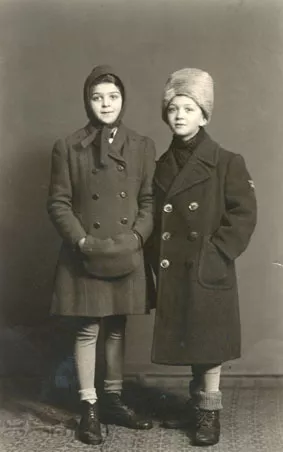These are some very distant relatives of my wife, Leon Bocler's grandchildren Sabina and Nelut or, to use their Jewish names, Lona and Leibu. I think the photograph was taken in Iasi around 1935. They lived on Aron Voda St. After the war, the brothers left to Israel. That's all I know about them.
A large part of the population of Iasi was of Jewish origin, approximately 50% before the pogrom. All our neighbors were Jewish. We all knew everybody else's woes and joys. Whether a child was born or if a bar mitzvah or a wedding was performed. There were entire weeks when you didn't even go out almost at all, people worked from morning till evening, radio or television didn't exist. Sometimes, our parents went to the Yiddish theatre. When summer came, it was a joy to go to the Pomul Verde or even on Rufeni St. where there was another Yiddish theatre. Our parents would sometimes go to the public park, but this happened very seldom. We spent time sitting with our neighbors in front of the house, we bought and ate sunflower or pumpkin seeds.
My wife has a beautiful story about one of her neighbors in Targu Cucului. She lived on the other side of the fence where her family lived. She had more room in the house and kept tenants. And when she accepted a tenant she explained to him what he rented. In fact, she rented him the room. The cellar was over at her neighbor's, they could store food there if they wanted. The clothes were hung to dry across the street, near the Zvolover synagogue. There was a large courtyard there with many trees and if the tenant wanted to hang his clothes to dry, he would tie clotheslines between trees and that's how clothes were dried. If they wanted water, there was another neighbor named Bodler who made casks and barrels. The neighbor would tell the tenant: 'bam Bodler nemt'm voser, bam Zvolover hengt'm greit, bam Suhn fun a bai iz du der keiler' [Yiddish: you can take water from Bodler, hang your clothes to dry at Zvolover, the cellar is over at Suhn's]. That's how she rented rooms, comfort 1. As for the toilet, it was all the way in the courtyard, a hole in the ground covered by wooden planks and a roof. Basically, these were the living conditions in those days.































